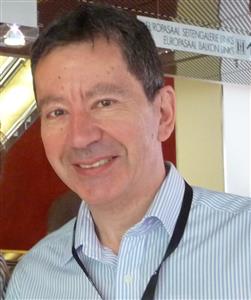Find more staff
Role:
Department staff:
Collaborations:
- AstraZeneca
- GlaxoSmithKline
- Agilent Technologies (Germany and USA)
- Waters Corporation (USA)
- University of Geneva
- University of Minnesota
- Thermo Fisher Scientific
- Kyoto Institute of Technology
- GL Sciences (Japan)
Research staff:

- Qualifications:BSc MSc PhD FHEA
- Position:Professor in Bioanalytical Science
- Department:HAS - Applied Sciences
- Telephone:+4411732 87353
About me
Winner of the Silver Jubilee Medal of the Chromatographic Society 2008. Winner of the Martin Gold Medal of the Chromatographic Society 2024. Member of the Editorial Board of Journal of Chromatography A/LC.GC. Author of most read article in LC.GC (europe) magazine 2019 h index 45 Invited Lectures since 2012, University of Geneva (Geneva, Switzerland 2012), Agilent Technologies (Waldbronn, Germany 2012), HPLC 2012 (Anaheim USA 2012), Journees scientifiques (Les Diablerets, Switzerland 2012), Spanish Society of Chromatography (Tarragona, Spain 2012), Ecole Superieure ESPCI (Paris, France 2013), HPLC 2013 (Amsterdam, Netherlands, 2013), Balaton Symposium (Balaton, Hungary 2013), Dutch Chemical Society (Utrecht, Netherlands 2013), HPLC 2014 (New Orleans, USA 2014), 7th Nordic Separation Society Symposium (Stockholm, Sweden 2014), 30th International Symposium on Chromatography (Salzburg, Austria 2014), CECE (Brno, Czech Republic 2014), MASSEP (Broad Institute, Harvard University USA 2015), Waters Corporation (Milford, USA 2015), University of Essen (Essen, Germany 2015), HPLC 2015 (Geneva, Switzerland, 2015), 8th Nordic Separation Society Symposium (Helsinki, Finland, 2015), 60th Anniversary Chromatography Society (London, 2016), HPLC 2016 (San Francisco, USA 2016), 31st international Symposium on Chromatography (Cork, Eire, 2016), Royal Society of Chemistry (London, 2016), Association francophone des sciences séparatives (Paris, 2017), HPLC 2017 (Prague 2017), Balaton Symposium (Lake Balaton, Hungary 2017), 23rd Norwegian Chromatography Symposium (Sandefjord, 2018), 32nd International Symposium on Chromatography, (Cannes, France 2018), Eastern Analytical Symposium, (Princeton, USA 2018), HPLC 2019 (Milan, Italy 2019, standard lecture), Balaton Symposium (Lake Balaton, Hungary, 2019), Agilent international conference on HPLC (virtual, 2021), HTC-17 (Gent, Belgium, 2022), HPLC 2022 (San Diego, USA 2022), British Mass Spectrometry Society (Manchester 2022), Club Lyonnaise de Chromatographie (Lyon, France, 2022), 6th Starrs conference on separation science (Hradec Kralove, Czechia, 2022), HPLC 2023 (Dusseldorf, Germany, 2023)
Area of expertise
Publications
 Publications loading...
Publications loading...
